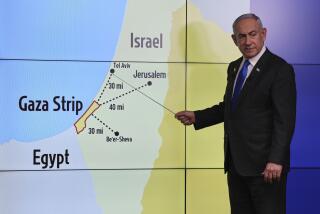Egypt takes more aggressive, and less neutral, approach to Gaza
CAIRO — Egyptians rallied in cities across the country Friday to show solidarity with Palestinians and to support or criticize Egypt’s new Islamist government, which has enlivened the Arab world with its diplomatic maneuvers and condemnation of Israel.
President Mohamed Morsi has not stopped the fighting between Hamas and Israel, but he has emerged as a more aggressive and less neutral player than his predecessor Hosni Mubarak, who was toppled in last year’s uprising. Morsi’s engagement is a testament to the rising profile of Islamists in the region’s political realignment.
“Morsi has made it clear that Israel’s attacks on Gaza are unacceptable. He used harsher terms than Mubarak,” said Mohamed Shahin, a writer and engineer. But, with an accustomed air of resignation, he added: “I believe Morsi did all he can do at this point. Not much will change in the long run.”
Morsi has withdrawn Egypt’s ambassador from Israel, urged the U.S. to intervene to stop the bloodshed and on Friday sent his prime minister to Gaza to try to broker a cease-fire. But Morsi, a former Muslim Brotherhood leader, was quickly schooled on Egypt’s limitations and the volatile risks it faces when Hamas and Israel traded fire shortly after Prime Minister Hesham Kandil met with Gazan officials.
While many Egyptians have backed Morsi’s stance thus far, others were critical that the government has not taken sharper steps, such as threatening to cut trade with Israel. They suggest Morsi’s approach has been too measured at a time when Israel, through its military action against Hamas, may also be testing Egypt’s resolve.
“We need to exert more pressure on Israel to end this war,” said Ahmed Hassan, a small-business owner. “Sending the prime minister for a couple of hours is not enough. This is not helping the people of Gaza. The airstrikes are resuming. Egypt needs to deal with Gaza like it’s an internal affair. This is a matter of national security.”
The question is: How much can Egypt do beyond calling for Arab League meetings and United Nations resolutions? Morsi has opened Egypt’s border with Gaza, which Mubarak had long closed down in cooperation with the Israelis to stop the flow of weapons to Hamas. But that comes with worries that resurgent militant groups, which have killed dozens of Egyptian security forces over the last year, will exploit the chaos along the nearby Israeli border.
Cairo does not want to upset its 1979 peace treaty with Israel for fear of losing Western support and investment even as it seeks to restore its role as the Arab protector of Palestinian interests. It is also navigating a region in tumult: Civil war in Syria, fresh protests in Jordan, uprisings in Bahrain, an unsteady Iraq, and political and security reverberations from the West’s sanctions against Iran’s nuclear program.
The most notable accomplishment by Morsi so far is the feeling among Egyptians that their government is finally on the right side of Arab passions. Mubarak, a close U.S. ally, would never have fronted such a harsh stand against Israel.
The change in Egyptian dynamics was evident Friday when Sheik Yusuf Qaradawi, a popular preacher with a radical streak, spoke at Cairo’s Al Azhar university, the revered seat of Sunni Islam education and research. Mubarak had banned Qaradawi, an Egyptian who has lived in exile in Qatar for years, from preaching at the institution.
“The lying and audacious Israel that manipulates history and reality arrogantly wants to show the world that it is strong,” Qaradawi said. “I tell Israel that you are facing one strong nation, which is the nation of the prophet Muhammad.”
He added: “The Egyptian people showed the world what a revolution should be. What they did in Tahrir Square taught the world how to put in effort, to give and to sacrifice. Egypt is the revolution that moved these nations.”
The rallies in Cairo and Alexandria on Friday were small compared to protests that have shaken Egypt’s political landscape for the last 20 months. That suggested Egyptians overall supported Morsi’s handling of the Gaza crisis but that many were also more concerned about their country’s own economic and social failings.
Such preoccupations, however, did not deter Egyptians like Hassan from offering more advice on what Cairo should be doing in Gaza.
“Egypt has a lot of economic interests with Israel. This is also something we could use as a pressure card to get them to stop this assault,” he said. “We should also call on the international community to exert pressure on Israel as well, not just America. Egypt should not be an intermediary here. We are on the same side of Palestinians.”
ALSO:
After heavy Israeli airstrikes, Gazans take a darker view
Rockets land near Jerusalem in escalation of Gaza fighting
Egyptian prime minister’s Gaza visit fails to bring lull in violence
More to Read
Sign up for Essential California
The most important California stories and recommendations in your inbox every morning.
You may occasionally receive promotional content from the Los Angeles Times.










